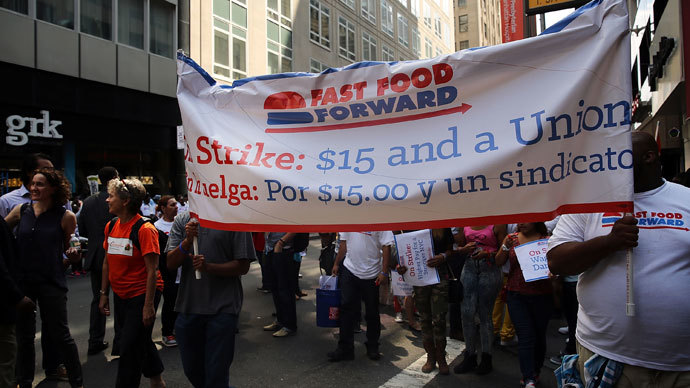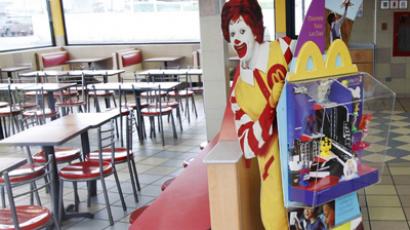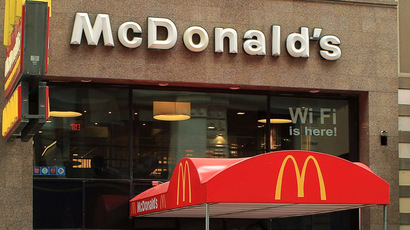'You can't survive on that': Fast-food workers across US strike for better wages

Fast-food industry workers across the United States staged a one-day nationwide strike demanding better wages and the right to form a union.
The Thursday event is so far the largest of its kind in a
10-month campaign that began in New York last November – starting
with just 200 workers – and spread to other major cities by July
2013. The number of cities is now at 60, organizers say.
McDonald’s, Wendy’s, Taco Bell and Burger King all came under
fire for holding their workers hostage to low wages. What the
workers have in mind is a raise to $15 from the current minimum
of $7.25, AP reports.
Even celebrities and politicians took part, with New York mayoral
candidate Christine Quinn joining a march of several hundred
workers who walked toward a McDonald’s by the Empire State
Building. Actor Stephen Baldwin was also spotted at an event in
Seattle, Washington.
Martin Rafanan, a community organizer in St. Louis, Missouri,
said that if the situation doesn’t improve the corporations who
employ low-paid workers will “pull all the blood, sweat, tears
and money” out of local communities.
"If you're paying $7.25 an hour and employing someone for 20, 25 hours a week, which is the average here, they're bringing home about $10,000 a year. You can't survive on that," Reuters reported Rafanan as saying.
Hundreds of fast-food industry workers across the U.S. join #strike demanding $15 an hour pay. pic.twitter.com/4FxK2ejMUo
— Arturo Lopez (@ArturoUnivision) August 29, 2013
However, the organization responsible for the American fast-food
industry, the National Restaurant Association, said the problem
was an exaggeration, with a spokesman of theirs telling Reuters
that "only 5 percent of restaurant employees earn the minimum
wage, and those that do are predominantly working part-time and
half are teenagers."
The US labor secretary, Thomas Perez, agreed with the need to
raise wages. He told the Associated Press that "the rungs on
the ladder of opportunity are feeling further and further
apart" for many people in the US.
An open letter to McDonald’s and several other major names was sent by Fast Food Forward – a New York-based group, who pointed out the huge gap that exists between company profits and the wages they pay to their employees, calling the “poverty” wages “shameful and outrageous.”
Fast food employees protest outside of Burger King in SW #Houston@KPRCLocal2 Nationwide #FastFood#Strikepic.twitter.com/epGzfu6hjq
— Courtney Gilmore (@KPRCgilmore) August 30, 2013
The group also underlined the fact that workers to this day are
targeted for organizing and protesting, with tactics by employers
ranging from reducing working hours to firing workers.
Many workers in the crowds had to work two jobs just to make ends
meet – often at competing fast-food chains. One such case, a
father of three, Terrence Wise, 34, told The Guardian "we
don't have a voice" and that the strike is as much a demand
for “respect” as it is about better pay.

President of the Service Employees International Union Mary Kay
Henry told The Guardian that "the fast-food workers are
fighting for all of us. SEIU members, like all service-sector
workers, are worse off when large fast-food and retail companies
are able to hold down wages and push down benefit standards for
working people."
There was no shortage of opponents to the strikes as well. The
National Retail Federation (NRF) lashed out at the events calling
them a “theater” performance staged by big labor and
adding that retail and restaurant jobs are enjoyed by millions of
Americans who are proud of what they do, and that the planned
strike is a carefully planned action that was years in the
making.
McDonald’s shot back as well, saying that, firstly, the minimum
wage rate does not stay at that level forever and that workers
move up through the ranks and eventually receive higher pay. The
company explained that if the wages were raised, it “would
potentially have a negative impact on employment and business
growth in our restaurants, as well as value for our
customers."
Wendy’s and Yum Brands, who own KFC, Pizza Hut and Taco Bell,
could not be reached for comment by the AP.
The protests coincide with US President Barack Obama’s plan to
push the federal minimum wage up to $9 an hour, but that is still
much less than the figure demanded by the workers.














